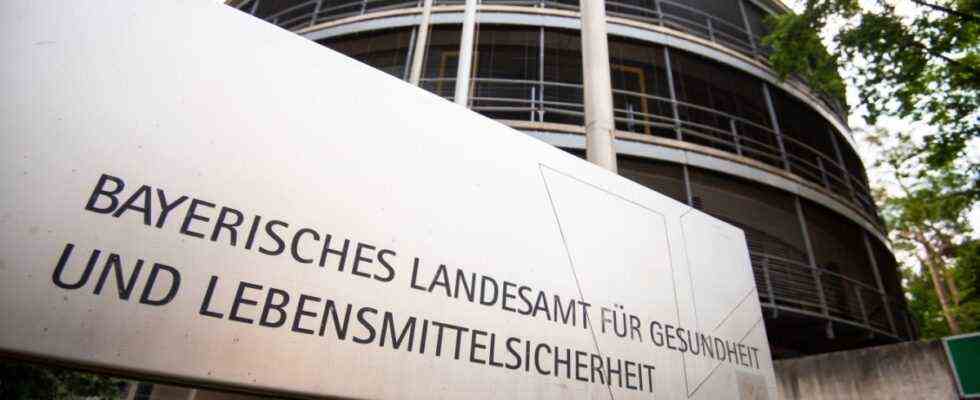The around eleven million surgical masks to protect against the corona virus, which are currently occupying the Bavarian judiciary, were delivered to cities, districts and so-called consumers in spring 2020. This was announced by the State Office for Health and Food Safety (LGL). The LGL had bought the masks, which later turned out to be defective, from a company in the Upper Palatinate. The consumers were hospitals, old people’s and nursing homes as well as medical practices. According to the state office, the masks were considered “marketable” based on the documents supplied. After pointing out deficiencies, that changed; The buyers were informed about this immediately.
According to its own information, the LGL has no overview of whether the cities and districts were able to take the masks out of circulation in time or not. It is also not known there whether the surgical masks posed health risks because users expected better protection than actually available. That will be checked by the Nuremberg-Fürth public prosecutor’s office. According to LGL, the filter performance of the masks was okay. But that did not apply to “individual other parameters”. The LGL did not provide any details. Surgical masks are the simplest form of protection; Masks with the FFP standard work better.
The public prosecutor’s office is investigating this matter on suspicion of fraud against two businessmen from the Neumarkt district in Upper Palatinate, who came into custody last week. The two had imported the masks from China and sold them to the LGL through a joint company when there was a shortage of protective equipment after the start of the pandemic. One of the two, Matthias Penkala, is a local politician for the Free Voters. He is in custody because of the risk of fleeing. Penkala, which is really important in such cases, with his functions in local politics, the free voters, with the social association VdK and with his company, is very rooted in his home country. This begs the question of why a 31-year-old who has more than half his life to go, for example, should go into hiding abroad. In addition, since a long flight would be costly and a few million euros from mask proceeds would not be enough by far.
The LGL paid around nine million euros for the masks. The public prosecutor suspects the two defendants of having produced fake confirmations about the quality of these masks. It is unclear why the searches and the two arrests took place only last week. According to its own information, the LGL received information shortly after the masks were delivered in April 2020 that the masks were not “marketable” after all. The LGL informed the State Criminal Police Office (LKA) about this in May 2020.
Around 14 months passed between these initial findings and the drastic measures taken last week. The public prosecutor’s office has now announced that the two businesspeople are in danger of fleeing, that it is a matter of weighing up. One considers the danger that the accused will evade the trial, greater than the prospect of “staying there”.
The case is also causing waves because the FW local politician Penkala had turned to the state chairman of the Free Voters and Minister of Economics Hubert Aiwanger in April 2020. It was about contacts with the LGL. The SPD state chairman Florian von Brunn spoke of an “Amigo business with dire consequences”. If the accusations of the public prosecutor’s office prove to be true, this would be a reason for Aiwanger to resign in Brunn’s view. Minister Aiwanger, for his part, called this a “witch hunt”. He and his ministry fought for the health of the population.
It is clear that at the beginning of the pandemic, when the demand for masks was particularly high, the handling of certifications was very different. A textile entrepreneur and SZ reader from Upper Palatinate, for example, described on Wednesday on the phone that in 2020 he imported a total of 600,000 masks from China by sea and air freight, including certification from a Polish company. He sold these masks to a hospital that had explicitly accepted the Polish certification. The entrepreneur offered the same type of mask to the LGL, but refused – with reference to the certification, which did not meet the standards, says the entrepreneur.
Test centers such as Dekra or TÜV usually certify products for the German market. At the beginning of the pandemic, it was also possible to apply for special approvals via the Federal Institute for Drugs and Medical Devices (BfArM) – because the need for protective equipment had increased enormously at short notice. In the meantime, the LGL has also set up its own testing facilities. The test centers, however, were hopelessly overloaded for a long time.
He would also have liked to have his masks certified according to German standards in the spring, says the entrepreneur from the Upper Palatinate, who wants to remain anonymous. Dekra’s okay that capacities should now be checked, however, only came in autumn – when the entrepreneur had long since stopped selling masks. He actually specializes in clothing and only wanted to help at short notice at the start of the pandemic.

